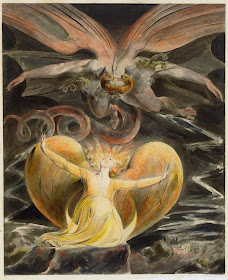From a practical post to a mystical one.
Existence could be described as the descent of the Real into reality. Heidegger calls this awareness of the Real 'Es gibt' ('It gives') which we experience as destiny.
If you watch the Wire (which Zizek persuaded me to do) you eventually get the sense that behind all the shootings, drug deals, arrests and subterfuge ('the game') there is a deeper, tragic narrative. What you see is reality, what you feel is the Real.
At various points thinkers (followed by the public at large) realise that the Real has a presence which is independent and authoritative, and there is a feeling of terror which accompanies this realisation.
Examples include Capital whose reality (or expression) is consumer society or Technology whose reality is all the gizmos we have.
You might think you are oblivious to all this - but you are not. Full awareness of the Real is always hidden but it seeps into popular culture nonetheless: recently we have a slew of movies in which the ascent of technology is foretold in apocalyptic terms - because at some level we are becoming aware that we are not masters of technology. In truth (the Real) we never were. Our lives are merely a part of the narrative that is the unconcealment of Technology - this is what is being revealed.
As the Real unfolds into reality it is distorted and 'corrupted' through expression. Through language. If you talk about it honestly it is incomprehensible (as this post may seem) but if you translate it, it can only be what everybody already knows.
I think of learning in this way. The Real of learning is what has concerned me for much of my career - it is a predictably strange and frightening narrative. I have tried to describe the Real of learning in the affective context model and its destiny in posts like this one. The latter post describes the progressive abandonment of you and me by learning. This is, as advertised, virtually incomprehensible - but we get echoes of it in debates about 'testing in schools' for example ('why test if it's all on the web?' etc.).
What we confront every day is the reality of learning: education, corporate training, learning systems and technology, buzzwords and trends.
In the learning industry or education, very little of the Real of learning is visible; there is a weak connection between the Real and reality. 'Courses to resources' is an example: it translates the Real mode of learning into a practice by way of a catchy phrase. But in doing so it risks corruption and - in this case - an attempt to break content into smaller pieces. (But I am not here to moan about that.)
Instead I am trying to sketch the outline of this process - in which destiny speaks and we listen poorly. There are no words for the Real. As it descends and reveals itself it must travel via our language which in turn translates into our reality. It can carry only a trace in our words. For this reason philosophers use strange words or use them strangely. This is not really a philosophical dilemma though; I encounter this problem almost every day where someone wants to talk about learning and I have to figure out if this is a conversation about the reality of learning (scorm, learning styles, 70/20/10, education etc.) or the Real of learning. Most commonly people imagine the two are the same and this makes for confused conversations.
This is not a practical post; just a scrawling for future intrepid explorers that says 'you are not alone'.

Fab post as ever, Nick. Forgive me for this pedantry, but where you say 'abandonment of you and I', you really mean 'abandonment of you and me'. This kind of trivial point-scoring almost embarrasses me, but it's too deeply-engrained for me to deny it at this stage in my life! It does not detract at all from what is another thought-provoking post.
ReplyDeleteQuite right. Corrected!
DeleteIsn't this our everyday life? You aks:"What are your (organisation's) learning challenges" and you get answers along the lines of: "We need more interactive video" or "We need to switch from Flash to HTML5". These common answer types are even at another level; it's not even the reality of learning. It's the reality of practicalities within offerings of pieces of information within a potential learning path. How do you steer people away from this focus and how do you guide them towards the reality? I am assuming conversations about the Real are quite rare?
ReplyDeleteYes - exactly. The reality of learning is precisely the everyday, that into which Heidegger fears we have 'fallen'. What he means is that we are too busy fussing about the latest fashions to stop and answer questions like 'why are we doing this?' or 'what is learning?'. In 25 yrs in education and corporate learning I have come to see that none of the small questions (about education policy, learning effectiveness etc.) can really be answered unless we first tackle the deeper ones. I wish I could answer your question about how to steer people Mirjam, I really do. I'm not sure I'm the right person for that job. It often seems to me that most people are just much more comfortable in the crowd. It turns out that finding the answer is the easy part... getting people to listen is near impossible :o)
DeleteHa, that last one made me laugh. Very reassuring though that you are finding that a challenge as well (getting people to listen). I would think that we should just keep asking the right questions so that we encourage people to think about them before they throw out their envisaged solutions. :)
DeleteRichard Bach put it memorably for me in 'Illusions' when a character points out that the clouds are illusion, but the beauty is real.
ReplyDelete